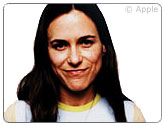By now I'm sure everyone's noticed Apple's new ad campaign,
"Real People." Just to let you know that they are real people, I
read Mark
Frauenfelder's weblog often.
But does this make these ads successful? I know why Apple wants
to put these people up here - they saw the great success that was
met using Steve (the "Dude, you're getting a Dell" kid) to sell
Dell computers.
Steve is a very effective marketing tool. Why? He is able to
preach his message to people of all ages.
30 or 40 year olds who think of a computer as this beige box
that lets them do their spreadsheets and calculate taxes will
remember Steve the next time they are at the computer store and
think, "Kids grew up with the computer, so they must know what
they're talking about."
Steve also works on kids by talking with other kids about how
they should get a Dell on TV. A typical 13 year old might see the
ad and figure "this cool kid on TV uses it so it must be a cool
computer."
Are Apple's ads effective?
Yes and no.
Apple's new ads work for those in the 30+ age group. These are
people who most likely won't have a lot of experience with the
computer and won't know enough to be able to decide what brand or
model they would like. If these people already have a computer,
they are probably still trying to upgrade their old 486 to Windows
95 or find Mac OS 8 for the Performa
6200 that their son or daughter told them to buy before going
off to college. These are the people who will listen to the type of
ads that Apple is producing so far with the "real people"
campaign.
Unfortunately, Apple is overlooking one of the most important
markets. Kids and teenagers, aged 10-20. Kids are extremely
influential when it comes to the family computer purchase. If
little Joey says to his mother that PCs are better because they
have more software, his mother will probably believe him.
If Apple wants to sell computers, Apple has to convince Joey
that the Mac is better. And how will Apple do that? No, Joey
doesn't want to hear about how
Sarah Whistler couldn't move things around on her PC or
 how
Liza Richardson disliked her PCs "stupid little
speakers."
how
Liza Richardson disliked her PCs "stupid little
speakers."
No, Joey wants to know how many games he can play on the Mac and
how he can easily burn CDs and access any site on the Internet.
Joey doesn't want a 35 year old guy telling him what computer to
buy; he'd rather have someone around his age.
This is why Steve works so well on kids. Apple doesn't need a
"Steve," but it does need to have some sort of ad featuring 10-20
year olds, specifically targeted for that age group.
While I like the overall direction that Apple is going with its
ads, I dislike the arguments it is presenting in those ads.
 Liza's PCs "stupid little
speakers" could have been replaced with more powerful ones. And the
possibility that Sarah Whistler didn't learn how to use the mouse
properly until after she bought a Macintosh isn't mentioned. And
Mark, as much as I like your weblog, I dislike the
fact that there is no mention of how the Macintosh was easier in
your commercial.
Liza's PCs "stupid little
speakers" could have been replaced with more powerful ones. And the
possibility that Sarah Whistler didn't learn how to use the mouse
properly until after she bought a Macintosh isn't mentioned. And
Mark, as much as I like your weblog, I dislike the
fact that there is no mention of how the Macintosh was easier in
your commercial.
If you go through the arguments, you will notice that most of it
is typical marketing department propaganda - not that I think it
won't help sell more Macintosh computers.

 how
how  Liza's PCs "stupid little
speakers" could have been replaced with more powerful ones. And the
possibility that Sarah Whistler didn't learn how to use the mouse
properly until after she bought a Macintosh isn't mentioned. And
Liza's PCs "stupid little
speakers" could have been replaced with more powerful ones. And the
possibility that Sarah Whistler didn't learn how to use the mouse
properly until after she bought a Macintosh isn't mentioned. And

